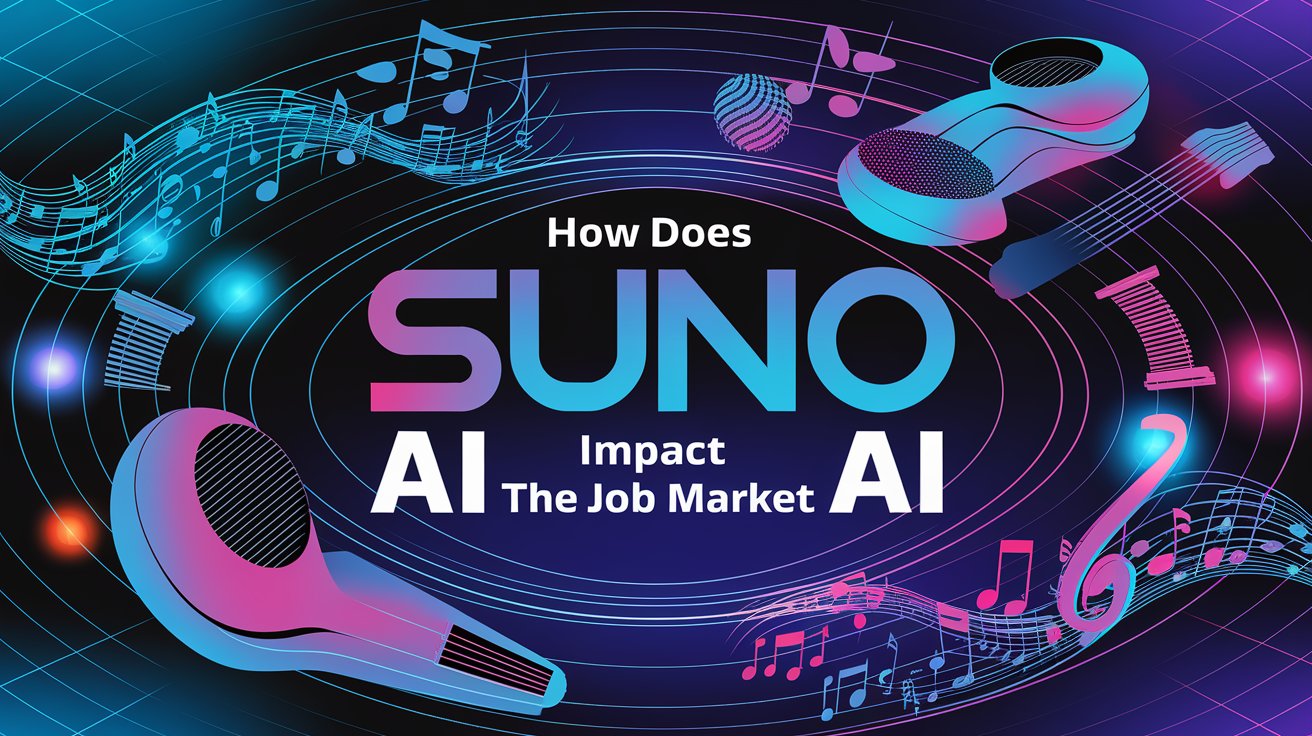Suno AI has ignited a fiery debate in the music industry, reshaping how music is created and challenging traditional roles for musicians, composers, and producers. By enabling anyone to generate radio-ready songs from simple text prompts, this AI tool introduces both opportunities and disruptions that ripple across the job market.
The Disruption: Threats to Traditional Roles
1. Automation of Entry-Level Music Production
Suno AI’s ability to craft full songs—complete with vocals, lyrics, and instrumentation—in seconds threatens roles like session musicians, background vocalists, and jingle writers. For example, advertising agencies or indie filmmakers can now bypass hiring composers for generic tracks, opting instead for AI-generated music tailored to their needs. This shift could reduce demand for low-complexity, high-volume music work, historically a starting point for many professionals.
2. Pressure on Songwriters and Lyricists
The ReMi lyrics model in Suno V4 generates sharp, creative lyrics that mimic human phrasing, raising concerns about the future of lyricists. While the tool lacks emotional depth, its speed and cost-effectiveness (free tiers vs. human fees) make it attractive for projects with tight budgets. A LinkedIn case study revealed that AI-generated lyrics now account for ~30% of content in some commercial music libraries, squeezing freelance opportunities.
3. Copyright Battles and Legal Uncertainty
Major labels (Universal, Sony, Warner) sued Suno in 2024, alleging its AI was trained on copyrighted tracks without permission. If courts side with labels, Suno might face restrictions, but a precedent favoring AI could let companies bypass human composers entirely for stock music. This legal gray area discourages investment in human-driven projects, as seen in Hollywood’s recent AI-driven scriptwriting cuts.
4. Vocalists and Session Musicians at Risk
Suno’s AI vocals now rival mid-tier session singers in clarity, though they lack nuanced emotion. Platforms like Udio (Suno’s competitor) report a 40% drop in hiring for demo vocals since 2024, with producers using AI for drafts. Similarly, instrumental tracks generated by Suno reduce reliance on session guitarists or drummers for filler content.
The Opportunity: New Frontiers for Musicians
1. Democratizing Music Creation
Suno AI lowers barriers for aspiring artists. A 2025 survey showed 62% of Suno users had no formal music training, yet 28% monetized their AI-assisted tracks on platforms like Spotify. For example, electronic artist “Neon Pulse” used Suno to prototype beats, later refining them with live instruments, cutting album production time from six months to six weeks.
2. Enhanced Creative Experimentation
Professionals use Suno to break creative blocks. Grammy-nominated producer Lila Mars told Billboard: “I feed Suno bizarre prompts like ‘post-apocalyptic jazz’ to spark ideas I’d never explore manually.” The AI’s genre-blending capability—mixing EDM with classical strings—has birthed new subgenres, expanding market niches.
3. Rise of AI-Human Collaboration Roles
New jobs are emerging:
- AI Music Editors: Tweak AI outputs for emotional depth (e.g., adding vocal imperfections).
- Prompt Engineers: Craft precise prompts like “dreamy 80s synth-pop with a melancholic bridge” to guide Suno.
- Ethics Consultants: Advise on avoiding copyright infringement in AI training data.
4. Live Performance and Merchandising
With AI handling studio work, artists focus on concerts and fan engagement. Pop duo “Echo Vector” attributes a 150% revenue increase in 2024 to Suno-assisted album production freeing time for touring.
The Balancing Act: Industry Adaptation
1. Upskilling for the AI Era
Music schools now offer courses like “AI-Assisted Composition” and “Ethics in Generative Music.” Berklee College introduced a certification program in 2025, teaching students to blend Suno drafts with live instrumentation.
2. Legislative and Union Responses
The Music Workers Union (MWU) negotiated “AI clauses” in 2024 contracts, ensuring human composers receive royalties if their style is mimicked. The EU’s upcoming Artificial Intelligence Act may mandate transparency in AI training data, potentially protecting human creators.
3. Niche Markets and Human Authenticity
Demand for “100% Human-Made” music grows. Platforms like HumanSound verify tracks through blockchain, offering a 20% premium over AI-assisted songs. Jazz and classical genres, where emotional nuance is critical, remain less impacted by Suno.
Future Outlook
By 2030, analysts predict:
- 50% Reduction in entry-level studio jobs (session players, lyricists).
- 30% Growth in live events and immersive experiences (VR concerts).
- $2B Market for AI music editors and prompt engineers.
As Suno co-founder Michael Shulman noted: “We’re not replacing artists—we’re replacing the friction in creation.” The musicians thriving today treat AI as a collaborator, not a competitor, merging its efficiency with human soul. Those resisting risk obsolescence; those adapting write the next chapter of music history.


